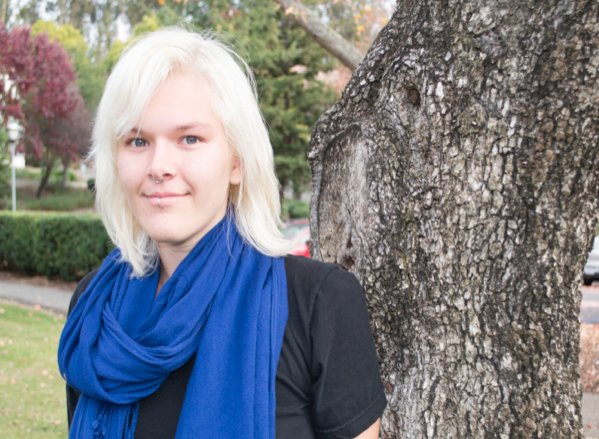
An Associated Press story about the implementation of Preferred Gender Pronouns at Mills and other US colleges, and the varying degrees of reception that have followed in the wake of its release, have caused an uproar among Mills College students, with alums also throwing their hats into the ring.
Featured as the face of the story was Skylar Crownover, president of Mouthing Off!, Mills’ LGBTQ* group, who identifies as gender nonconforming and goes by they/them or he/him. Crownover explained that the founding mission statement for Mills was to provide a space in higher education for “the oppressed gender,” as stated in the Gender Identity and Expression sub-committee’s Report on Inclusion of Transgender and Genderfluid Students: Best Practices Assessment and Recommendations.
“At the time the ‘oppressed gender’ was cisgender women,” Crownover said. “Now, Mills’ mission is still to provide access to higher education to oppressed genders, but that now includes not only cisgender women but trans* and gender non-conforming students, while maintaining a women’s centered curriculum and focus.”
Preferred gender pronouns exploded onto the academic scene at Mills in 2011, when then sophomore Shaun Salas introduced the practice of distributing PGP cards to professors so they would be aware of identities other than female present in the classroom. Since then, gender neutral pronouns like “they” have become more commonplace at Mills, forcing the implementation of new policies rather than leaving it a single-sex identified campus.
“I think that, especially just within the past two years, there have been so many huge conversations that had never happened prior that I’m hopeful because I feel like Mills, more so than being a women’s college, is a safe and brave space for people that are oppressed in the sense of gender,” said sophomore Joss Ferguson, who goes by “they” and was also featured in the Associated Press article. “A women’s college doesn’t necessarily mean a ciswomen’s college.”
However, these new ways of thinking about the gender of students who attend Mills have raised some uneasiness and anger where policies are concerned. Alums have spoken out on social media against altering the core identity of Mills as a women’s college, reminiscing on the 1990 strike to stop the College from going co-ed.
“For me, Mills belongs to women – past, current, and future,” said Alexa Pagonas, a 1991 Mills alum. “It was started as a way to educate women. In 1990 many of us fought very hard to keep her [Mills] all women. That is her herstory and that is her mission. I am not feeling particularly generous on giving up on that.”
In an effort to demonstrate solidarity with the growing movement to break gender binaries and with Mills students who do not identify as women, Associated Students of Mills College (ASMC) changed the traditional SPAM chant to reflect gender neutrality. Instead of “Strong Women! Proud Women! All Women! Mills Women!,” the mantra is now “Strong! Proud! All! Mills!”
“[SPAM] was created to show support of staying a women’s college,” said Pagonas, one of three Mills strikers who brought the chant to life during the 1990 strike. “To remove ‘women’ from the vocabulary weakens the position for the institution as a single sexed school. I am proud to be a woman.”
While the reception of the story has varied from supportive to negative, Ferguson feels that the students who participated in sharing their stories were unfairly represented, with little to none of the dialogue they had during the interview being featured in the body of the article. Ferguson said that their faces were simply used as representations of the issue at hand without any of the personal stories they told about identifying as something other than female or male.
“If you hear quotes, and you’re reading that this is how this person experiences it and you know that they are a trans* person, that’s going to be a much clearer depiction of what it’s like and what it means than having that erasure and the actual dialogue that happened not being placed and it being separated by the linguistics of a professor at a college,” Ferguson said. “We didn’t know that was going to happen. None of us knew we weren’t actually going to be quoted, and I think that was really what surprised me.”
The question of what effect dissociating Mills with the identity of a single-sex women’s college will have on the admission’s policies is one that has been frequently discussed in on-campus gender inclusivity circles. Would an admissions policy that allowed students who are not female identified mean that the College would go co-ed? Crownover does not find it likely.
“I would say no, since that does not align with Mills’ mission statement to provide access to higher education for oppressed genders,” Crownover said. “Modern society still privileges cisgender men in a way that it does not privilege cisgender women, trans*, and gender non-conforming people.”
However, Dr. Meighan Katz, class of 1992, believes that Mills’ identity as a women’s college is an essential part of its history, purpose and mission. While she is “deeply sympathetic” to those who feel like outcasts because of gender binaries and admires the fact that current Mills students are passionately debating the issue, she believes that the line between Mills and a co-ed liberal arts college “only has so much elasticity before it breaks.”
“The nature of the institution means that it inherently cannot be all things to all people. Does Mills have a responsibility to help mold women who go out into the world and try to make it a safer place for everyone? Absolutely. Can Mills itself be that safe space for everyone? No.”
